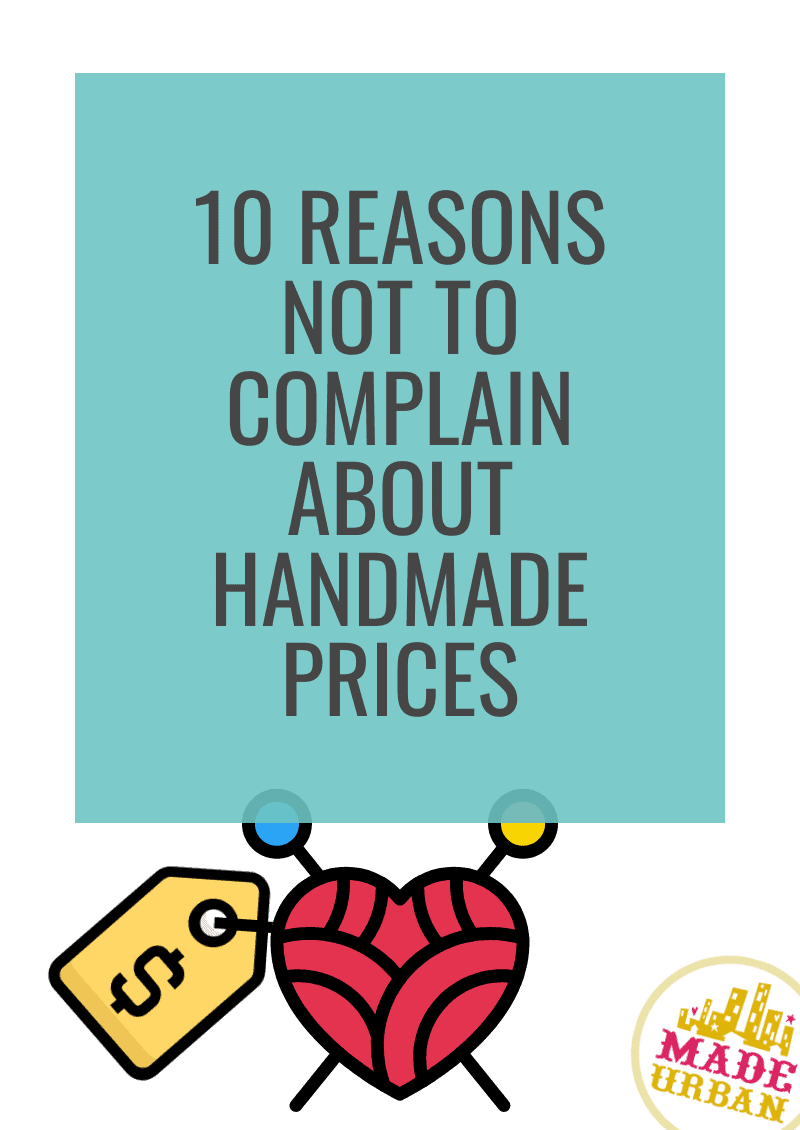10 Reasons NOT to Complain about Handmade Prices
After writing and posting 10 Reasons to NOT to Lower the Prices of your Handmade Goods, I came across a comment on social media that made me think; an article explaining why craft show and Etsy shoppers shouldn’t make remarks about a vendor’s prices being higher than they would like.
The people who don’t value handmade or understand why the prices are higher than mass-produced items are few and far between, but let’s be honest, most of us have dealt with a “it’s so expensive” comment at a craft show or online.
Feel free to share this article with your craft business’s social media followers to help more people understand the value of handmade and why (unless asked for feedback) you shouldn’t tell handmade business owners that their prices are too high.
1) “Your prices are too high” will likely hurt the maker’s feelings
When you make negative comments about a handmade item, the creator of that product will hear/read it and it’s likely going to hurt their feelings. You’re not dealing with a large corporation where people are hired to post on Facebook, answer emails, sell products, etc. The person who makes the items is the same person running the craft show booth, posting to social media and reading comments, answering emails, etc. They’ve put a lot of work into every aspect of their business, but especially the products they make. Why would anyone want to make them feel bad about the work they’re putting out there?
2) “Too expensive” is the equivalent of “your work isn’t good enough”
After shopping a craft show table or spending time in an Etsy shop, deciding not to buy and telling the maker why (too expensive) is saying you like their work, but not enough to pay what they’re charging.
3) A handmade business can’t appeal to everyone
A small business must choose a target market and build a business that appeals to them. They’re not a department store that can offer a variety of products at a variety of price points to cater to a wide range of shoppers. They’ve decided to charge what they’re charging based on several factors; one of them being the type of consumer they’re appealing to. If those prices are above what you’re willing to pay, you may not be a fit for their business.
4) Prices are carefully calculated
It takes a LOT of effort to properly price handmade products. Don’t believe me? Just check out how many steps a maker must follow to get the correct price for each product they make: steps to price a handmade product. They’re not pulling a price out of a hat and seeing how many suckers are willing to pay it. They’ve likely taken hours to calculate expenses and other factors that determine prices.
5) Handmade business owners must wear multiple hats
Most handmade businesses are run by one person. But that doesn’t mean they have the workload of one person. Every business has similar work to complete, just on different scales. A large company has multiple employees to take care of each department. A handmade business owner must be the:
- graphic designer/branding department
- web developer
- photographer
- social media manager
- product designer
- pattern drafter
- manufacturer
- label and packaging department
- shipping department
- marketer
- salesperson
- accountant
- etc.
If they’re not completing these tasks themselves, they’re paying another business to do it. And those costs must be factored into product prices.
6) They’re probably underpaid
Most makers don’t charge for all the hours they put into their business. And if they are tracking all of their time and charging wages (that then must be factored into prices), likely, they’re not charging much more than minimum wage for their time. So the price you see is probably less than what they should be charging.
7) It’s not a get-rich-quick scam
Starting a handmade business takes a lot of time, money, and effort. They’re not trying to take advantage of anyone and there are a lot easier ways to make money. They’re putting their best work out there in hopes to make enough money to be able to wake up and do it again tomorrow.
8) They’re not raking in the cash
Maybe they do have goals to grow their company and one day make millions of dollars but at this point in the game, they’re working hard to make each sale which, if they’ve priced their products properly, will cover their costs and make a small profit. Until a handmade business stars hiring out work and making their products less “handmade”, I can guarantee, they’re not getting rich from craft show or Etsy sales.
9) Not all handmade items are created equally
One knitted hat you see on Etsy is not the same as another knitted hat. They may use different quality fabric, different knitting techniques, be more skilled at their craft, or put more time/money into marketing, packaging, customer care, etc. Don’t compare prices from one handmade vendor to the next. And definitely don’t compare the price of an item you find at the mall to a handmade item; it’s apples and oranges.
10) The choice is yours
At the end of the day, you’ve chosen to shop handmade at a craft show or on Etsy. If you want something cheaper, it’s best to shop with a business that mass-produces their products. If you don’t understand why an item is the price it is, instead of telling the maker their prices are too high, ask them to tell you about their products and business. You’ll likely find out how much hard work and thought goes into each item.
Please feel free to share what makes your handmade work unique and worth the prices you charge.


Hey, I’m Erin 🙂 I write about small business and craft show techniques I’ve learned from being a small business owner for almost 2 decades, selling at dozens of craft shows, and earning a diploma in Visual Communication Design. I hope you find my advice helpful!

My we (I) share this on my Facebook page??
Please feel free 🙂 Thanks so much!
May I share this on my Instagram?
I agree .
I’m an artist and I do well at arts and craft festivals. The biggest question I get is why my prices are so low. They range from $50-$90. My response is “It’s about the art. Not the money”. I’m pleased that I’m able to find them homes.